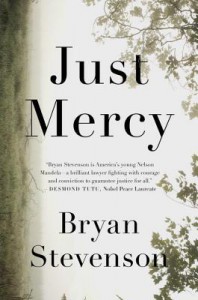I'm only in the Introduction . . .

. . . and I already know this is going to be powerful.
a few weeks ago, the review by Lauren B. Davis caught my eye and I jumped on the library's waiting list.
in 1983, Bryan Stevenson had just finished a year of law school and was feeling pretty disillusioned and disassociated; he didn't see how a law degree was going to help him meet his goals, but that was before he signed up for an internship with The Southern Prisoners Defense Committee. Within a matter of days, he was on the road by himself, because none of the SPDC attorneys could get away, to meet with a death row inmate. The message was a simple one -- you will not be executed within the next year.
Bryan was in a cold sweat and practicing continuously but inconclusively, and by the time he reached the prison he still had no idea how he would relay his news. He fell into incoherent apologies, but the interview changed his life.
Now he tells us this:
"Each of us is more than the worst thing we've ever done.
My work with the poor and the incarcerated has persuaded me that the opposite of poverty is not wealth, the opposite of poverty is justice. . . I've come to believe that the true measure of our commitment to justice, the character of our society, our commitment to the law, fairness, and equality cannot be measured by how we treat the rich, powerful, the privileged, and the respected among us. The true measure of our character is how we treat the poor, the disfavored, the accused, the incarcerated, and the condemned.
We are all implicated when we allow other people to be mistreated. An absence of compassion can corrupt the decency of a community, a state, a nation. Fear and anger can make us vindictive and abusive, unjust and unfair, until we all suffer from the absence of mercy and we condemn ourselves as much as others."
I'm looking forward to the next 300 pages.
 15
15
 4
4

